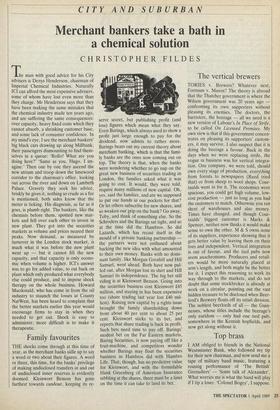CITY AND SUBURBAN
Merchant bankers take a bath in a chemical solution
CHRISTOPHER FILDES
The man with good advice for his City advisers is Denys Henderson, chairman of Imperial Chemical Industries. Naturally ICI can afford the most expensive advisers, some of whom have lost even more than they charge. Mr Henderson says that they have been making the same mistakes that the chemical industry made ten years ago, and are suffering the same consequences: over capacity, heavy fixed costs which they cannot absorb, a shrinking customer base, and some lack of consumer confidence. In my mind's eye, I see the merchant bankers' big black cars drawing up along Millbank, their passengers dismounting to find them- selves in a queue: 'Rollo! What are you doing here?' Same as you, Hugo, I im- agine.' Then one by one they ascend the new atrium and troop down the limewood corridor to the chairman's office, looking out across the river and down on Lambeth Palace. Gravely they seek his advice, briskly he gives it, nothing so crude as a fee is mentioned, both sides know that the meter is ticking. His diagnosis, as far as it goes, is plumb right. The bankers, like the chemists before them, spotted new mar- kets and fell over each other to invest in new plant. They got into the securities markets as volume and prices neared their peaks. Now demand, as measured by turnover in the London stock market, is much what it was before the new plant went up — but it cannot fill the new capacity, and that capacity is only econo- mic when volume is higher. ICI's answer was to go for added value, to cut back on plant which only produced what everybody else could produce, and to impose shock therapy on the whole business. Howard Macdonald, who has come in from the oil industry to staunch the losses at County NatWest, has been heard to complain that the better markets earlier this year would encourage firms to stay in when they needed to get out. Shock is easy to administer; more difficult is to make it therapeutic.


















































 Previous page
Previous page